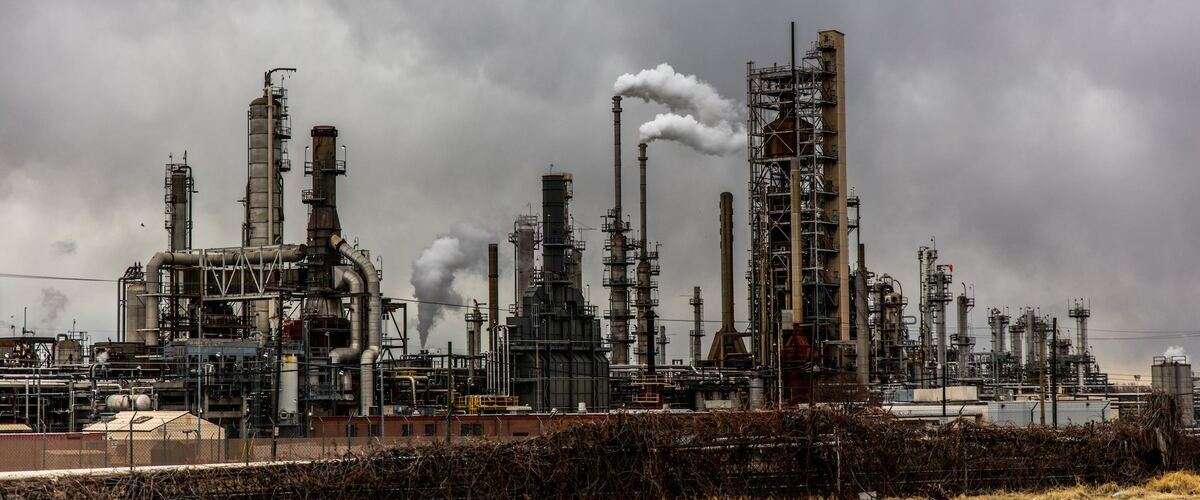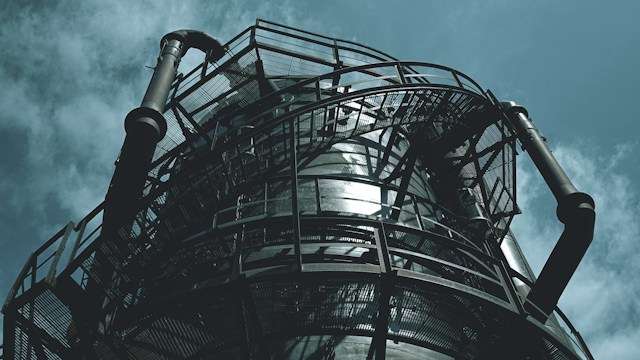Marketing For Oil and Gas Companies
Over a decade of specialized experience positions Optimum7 at the forefront of mastering the complex marketing needs of the oil and gas industry, offering customized, high-impact strategies that drive tangible results for our esteemed clients.
Why Oil and Gas Companies Choose Optimum7
We understand the complexities of B2B marketing in the energy sector. It's not just about generating leads—it's about navigating intricate sales cycles, engaging with diverse buying teams, and adhering to ever-evolving regulatory frameworks. Success in this landscape requires a strategic marketing partner that blends deep industry knowledge with advanced digital execution.

Key Industry Challenges We Solve
- 35+ touchpoints before deal closure
B2B sales in oil and gas involve an average of 6 to 10 stakeholders and 35+ interactions across months of research, proposals, site visits, and due diligence. Each touchpoint requires consistent, relevant messaging. - Natural gas sector complexity and segmentation
Marketing for natural gas involves a layered approach—balancing messaging for exploration companies, LNG infrastructure developers, utility distributors, and regulatory bodies. Communication must address safety, supply security, and sustainability in equal measure. - Long, complex sales cycles with multiple decision-makers
Deals can span 6 to 18 months or longer. Procurement, engineering, finance, and executive teams must all be aligned—demanding a strategic, multi-layered approach to nurturing. - Difficulties measuring ROI and tracking lead behavior
63% of industrial marketers say their biggest challenge is tying marketing actions to revenue. Without attribution models and integrated CRM systems, teams waste budget on blind spots. - Navigating compliance in messaging
Marketing materials must adhere to safety, environmental, and financial regulations—especially when targeting global markets. Mistakes can lead to reputational damage or legal action. - Communicating technical advantages to non-technical stakeholders
Decision-makers may not have engineering backgrounds. Bridging that knowledge gap with simplified messaging is essential for effective persuasion. - Regulatory and compliance pressures
Oil and gas companies face strict local and international regulations. The U.S. EPA, for instance, issued over $280 million in civil penalties in 2023 alone. Marketing teams must carefully navigate these legal environments to avoid violations. - Technological innovation and adoption
With 45% of oil and gas firms increasing investment in digital solutions (PwC), marketing teams must translate innovations like IoT, AI, and automation into clear, benefit-driven messaging. - Market volatility and economic sensitivity
Oil prices can swing dramatically, as seen in 2020 and again in 2022. Marketing must remain agile, relevant, and consistent through boom-and-bust cycles. - Supply chain impacts
Global disruptions—from pandemics to war—have highlighted how fragile energy supply chains can be. Marketing must reassure stakeholders about resilience and delivery. - Litigation trends and reputational risk
Increasing climate-related lawsuits and activist pressures demand greater transparency. Messaging must protect the brand while staying legally sound and socially responsible. - Managing reputation in a high-risk, heavily scrutinized industry
Public and investor trust is fragile. One misstep in branding or communication can cause significant fallout, especially around environmental or social governance issues. - Adapting to geopolitical shifts and supply chain disruptions
From global conflicts to sanctions and trade route instability, oil and gas companies must pivot fast. Marketing must reflect operational adaptability and business continuity. - Balancing investment in fossil fuels with the energy transition
Stakeholders increasingly demand clear positioning on renewables, emissions, and long-term strategy. This tension must be addressed head-on. - Recruiting and retaining skilled technical talent
With an aging workforce and growing demand for digital skills, marketing also plays a role in employer branding and talent acquisition. - Aligning messaging across global markets with local regulations
Oil and gas firms operate in dozens of countries, each with its own legal, cultural, and environmental expectations. Unified but adaptable messaging is key. B2B sales in oil and gas involve an average of 6 to 10 stakeholders and 35+ interactions across months of research, proposals, site visits, and due diligence. Each touchpoint requires consistent, relevant messaging. - Long, complex sales cycles with multiple decision-makers
Deals can span 6 to 18 months or longer. Procurement, engineering, finance, and executive teams must all be aligned—demanding a strategic, multi-layered approach to nurturing. - Difficulties measuring ROI and tracking lead behavior
63% of industrial marketers say their biggest challenge is tying marketing actions to revenue. Without attribution models and integrated CRM systems, teams waste budget on blind spots. - Navigating compliance in messaging
Marketing materials must adhere to safety, environmental, and financial regulations—especially when targeting global markets. Mistakes can lead to reputational damage or legal action. - Communicating technical advantages to non-technical stakeholders
Decision-makers may not have engineering backgrounds. Bridging that knowledge gap with simplified messaging is essential for effective persuasion. - Managing reputation in a high-risk, heavily scrutinized industry
Public and investor trust is fragile. One misstep in branding or communication can cause significant fallout, especially around environmental or social governance issues. - Adapting to geopolitical shifts and supply chain disruptions
From global conflicts to sanctions and trade route instability, oil and gas companies must pivot fast. Marketing must reflect operational adaptability and business continuity. - Balancing investment in fossil fuels with the energy transition
Stakeholders increasingly demand clear positioning on renewables, emissions, and long-term strategy. This tension must be addressed head-on. - Recruiting and retaining skilled technical talent
With an aging workforce and growing demand for digital skills, marketing also plays a role in employer branding and talent acquisition. - Aligning messaging across global markets with local regulations
Oil and gas firms operate in dozens of countries, each with its own legal, cultural, and environmental expectations. Unified but adaptable messaging is key.
- 35+ touchpoints before deal closure
These challenges are deeply embedded in the oil and gas industry. Without a clear and cohesive strategy, marketing efforts can fall short—leading to missed opportunities, inefficient resource use, and prolonged deal cycles. Our strategies are designed to connect the right message with the right audience at the right stage of the buying journey.
Optimum7’s Comprehensive Marketing Strategies for Oil and Gas Companies
To stand out in the competitive oil and gas industry, you need a strategic and comprehensive marketing approach. Optimum7 understands the unique demands of this sector and provides marketing solutions designed to effectively engage your target audience and strengthen your brand's position.

Search Engine Optimization (SEO)
Enhancing Online Visibility
Dominate high-intent search results with content designed for your industry’s unique terminology, regulatory language, and decision-maker behavior.
- Technical and service-specific SEO
- Local SEO for regional operators
- Optimized white papers and case studies

Pay-Per-Click (PPC) Advertising
Targeting Decision-Makers
Put your brand in front of high-level decision-makers on Google, LinkedIn, and industry sites.
- Industry keyword targeting
- Retargeting for longer B2B cycles
- Budget-optimized campaigns focused on lead quality

Email Marketing
Building Lasting Relationships
Build relationships across long sales cycles with targeted, segmented email campaigns.
- Automated nurturing sequences
- Compliance-friendly messaging
- Technical and commercial content by role

Video Creation and Marketing
Telling Your Brand's Story
Communicate your capabilities with clarity and impact.
- Facility tours, technology explainers, safety protocols
- Content optimized for YouTube, LinkedIn, and SEO
- Build brand trust with visually rich storytelling

Web Design
Increasing Online Engagement
Modern, technical, conversion-focused design.
- Built for lead capture and stakeholder engagement
- Responsive, fast, and optimized for mobile field teams
- ESG storytelling, safety, and compliance features
At Optimum7, we recognize the critical role each marketing channel plays in navigating the multitude of touchpoints in the B2B oil and gas industry. Our integrated marketing strategies are designed not just to reach your target audience but to resonate with them, building a formidable and enduring brand presence in this competitive sector.
Get A Custom Marketing Strategy For Your Oil And Gas Business
Oil and Gas Marketing Trends for 2025
- AI-Powered Lead Qualification
According to McKinsey, AI adoption in oil and gas could reduce operating costs by up to 20%. Companies are now using AI for smarter lead scoring and sales prioritization across B2B platforms. - ESG and Sustainability Focus
A Deloitte report found that 92% of institutional investors consider ESG performance when making investment decisions. Energy companies are expected to improve transparency and use ESG storytelling as a strategic differentiator. - Video and Virtual Site Walkthroughs
HubSpot data shows that video is the most preferred content format for B2B buyers. Virtual site tours are becoming essential for global buyers and remote sales enablement, especially post-COVID. - CRM Integration and Real-Time Campaign Adjustments
Research from Forrester shows that companies using real-time CRM insights for campaign management experience a 35% improvement in conversion rates. This integration enables agile marketing decisions based on live sales feedback. - Sector Growth Outlook
The global oil and gas market is projected to grow from $7.1 trillion in 2023 to over $8.8 trillion by 2030, at a CAGR of 3.4% (Fortune Business Insights). This growth is driven by rising energy demand and increased investments in LNG and refining capacity. - Technology Adoption Across Operations
PwC reports that 45% of oil and gas companies are increasing investments in technologies such as IoT, automation, and digital twins to improve operational efficiency and resilience.
- AI-Powered Lead Qualification
These trends are redefining how oil and gas companies communicate with stakeholders and position themselves in a competitive, fast-evolving marketplace.
Deep Dive into Oil and Gas Marketing Challenges

The oil and gas industry, with its complex value chains, regulatory environments, and global market dynamics, presents distinct marketing challenges that require specialized approaches.

Regulatory and Compliance Pressures
Companies in the oil and gas sector must navigate a labyrinth of regulatory requirements and compliance standards, which can significantly impact marketing messaging and communication strategies. The need to demonstrate compliance, not just in operations but in how products and services are presented and promoted, requires a marketing partner well-versed in the legal and regulatory nuances of the industry.
Technological Innovation and Adoption
The rapid pace of technological innovation in the oil and gas industry, from exploration and extraction technologies to renewable energy integration, poses a challenge in effectively communicating the value and implications of these advancements to a diverse audience. Marketing strategies must not only highlight technical features but also articulate the practical benefits and ROI of adopting new technologies.


Market Volatility and Economic Sensitivity
Oil and gas markets are notoriously volatile, with prices and demand subject to geopolitical events, regulatory changes, and economic fluctuations. Marketing strategies must be agile and responsive, able to pivot in response to market dynamics while maintaining a consistent brand message.
Optimum7's Strategic Solutions for Oil and Gas Challenges
Optimum7 has dedicated over a decade to developing marketing strategies for the oil and gas sector. We recognize the industry's inherent complexities, including regulatory compliance, rapid technological advancements, and market volatility. Our approach is designed to address these challenges effectively.
Our oil and gas marketing services enable your company to maintain relevance in a dynamic industry, demonstrate adherence to industry standards and environmental responsibility, and establish a position of leadership. We understand the nuances of the oil and gas industry, allowing us to create targeted marketing campaigns.
Our focus is on fostering meaningful connections, highlighting your company's unique strengths, and utilizing agile strategies to navigate market shifts. Ultimately, Optimum7 aims to position your company as a distinguished and successful entity within the petroleum industry.
Our goal is simple: to help your company stand out, connect with your audience, and lead the oil and gas sector with clarity, confidence, and consistency.
FAQs: Oil and Gas Marketing Services
Do you work with upstream, midstream, and downstream companies?
Absolutely. We tailor strategies based on your market segment, audience, and operational model to maximize relevance and results.
Can you help us with ESG-related messaging?
Yes. We specialize in building ESG communication frameworks that align with industry standards while reinforcing your environmental leadership.
How long does it take to see results?
SEO typically yields results within 3–6 months, while PPC, email, and video campaigns can deliver ROI as early as 30–90 days depending on campaign scope and budget.
Do you provide reporting and analytics?
Yes. We provide monthly performance dashboards and strategic insights, so you always know what’s working and where we’re optimizing.
How do you measure marketing ROI in oil and gas?
We use CRM tracking, UTM parameters, and multi-touch attribution models to prove campaign value.
Can you help communicate complex tech to non-engineers?
Yes. Our writers and strategists specialize in simplifying technical value propositions for executive audiences.
Get a Custom Oil and Gas Marketing Strategy
Let’s build a marketing engine designed specifically for your sales cycle, industry position, and growth goals.

Join our email list to receive exclusive insights and tips directly from our CEO
